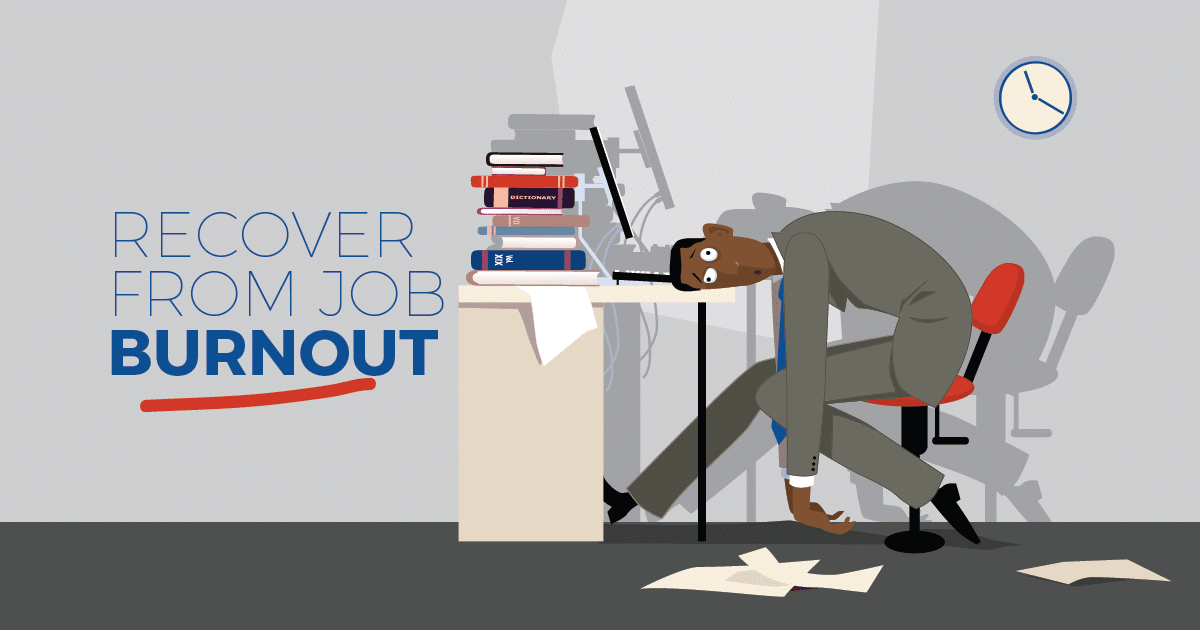Let’s face it, the daily hustle to get that paycheck is very stressful. No matter how excited you are at the beginning of a new job, it gets to a point where your stress levels rise, you get constantly exhausted and lose motivation to work. Thus, you begin to experience what is called a job burnout. You will go through this at some point during your working experience if you are not currently facing it.
There are many factors that lead to job burnout which can force you to quit your job. But what if there are other remedies outside quitting your job?
Let’s dive deeper and find out more about what to look out for to know you’re experiencing a burnout and what to do;
Table of Contents
What is Job Burnout?

Let’s begin with a quick exercise. Your answers to these questions will give you a broader understanding of what we are discussing.
- Are you getting rooted in overwork?
- Are you scared of getting laid off or in conflict with your boss or coworkers?
- Do you feel unrecognized by your boss and not getting promoted?
- Are you receiving your deserving compensations?
If you answered yes to any of these questions then you’re experiencing the job burnout syndrome.
Job burnout is the state of feeling of exhaustion physically or emotionally lacking strength or motivation to work. When you experience job burn out, the going to work every day becomes a battle to fight every day. Here are some signs that prove you may be experiencing the job burn out syndrome.
Symptoms of Job Burnout

1. Exhaustion
A clear sign of job burnout is when you feel tired all the time because of work stress. Exhaustion happens when your energy runs low and you feel completely drained emotionally, mentally or physically. You are likely to experience all three types at a go when you burn out on a job. For instance, if you find yourself working overtime for a long period, you will suffer exhaustion and can eventually break you down physically. Your health could equally be affected as you will suffer fatigue and other heart-related complications.
2. Lack of Motivation
Another symptom of a job burnout is the lack of motivation to work. For example, you will drag yourself when preparing yourself in the morning to go to work and even harder to concentrate while working. Your motivation to score points at work begins with yourself and burnout occurs when you lose that sense of self-motivation in the workplace.
3. Frustration & Pessimistic Reactions
Do you feel like what you’re doing doesn’t matter anymore? You might notice that you feel more generally pessimistic than you used to. While everybody experiences some negative emotions from time to time, it’s important to know when these are becoming a daily occurrence and unusual for you.
4. Slipping Job Performance
Not sure whether you’re burnt out? Compare your job performance now to your performance previously. Do you remember the kind of energy you expended doing your job especially when you first started work? Because burnout tends to happen over an extended period of time. Taking this long-term view might reveal whether you’re in a temporary slump or experiencing more chronic burnout.
5. Getting Preoccupied With Work Outside Working Hours
Are you constantly working during your resting time? If you’re expending mental energy mulling over your job outside working hours, then your work is interfering with your ability to recover from the stresses of your day. No matter your type of work, you need time for yourself to rest and rejuvenate for the next day. You need that space where you are not thinking about a given task. When you constantly worry about unattended work you are going to get stressed and suffer from job burnout.
The Way Forward

With all that has been discussed about job burnout and the understanding you now have, it is time to know the remedies that can help you recover from the situation;
1. Become More Selfish
If you’re spending your days only responding to the requests of others and constantly saying “yes,” even when you’re swamped, you will burn out. That’s why you see many companies encourage their employees to participate in passion projects to let individuals work on something that they want to.
Remember, you sometimes just have to say ‘no.’ If you don’t have the time for any additional tasks or to stay late working on something that’s not a part of your job description, then you need to politely inform your leader or colleague that you can’t accept their requests.
2. Take Some Time Off
When you start to feel emotionally, mentally and physically drained, that’s usually a sign that you need to take some time off. While a two-week vacation sounds like the perfect solution, that may not always be feasible. You could, however, plan for a long weekend, make the most of your vacation, rest and replenish all the energy you lost over the week.
3. Keep Your To-do-lists Minimal
Take a look at your to-do list for your job. Does everything on your list have to be done immediately? To-do lists come in handy in completing your work for the day. When overstuffed with tasks, you find yourself trying to multitask by doing too much which means, in the end, you won’t do dedicate enough time and effort on each task. Whittle down your lists by only emphasizing on the three most important priorities for the day. In short, keep your lists short and manageable to avoid feeling overwhelmed.
4. Do Something Interesting
When stressed at work, take a few minutes to do something you enjoy doing, like going for a short walk to clear your mind, browsing the internet or listening to music. If you also identify the most fulfilling elements of your work, you can try to dedicate more time to those tasks. Outside of work, you should work on a passion project. Whether it’s starting a side business, or writing a book, it will not only pique your curiosity but also spur your energy.
Now that you have a good understanding of job burnout, do not compromise on it’s the outcome. When you see the signs, do your best to remedy the problem with the solutions given you in this article.But, if you still can’t find the urge to push you to work willingly every day, figure out whether you need a new job or a career change.
Has this article been helpful in resolving your job burnout problems? Tell us in the comment section below.





